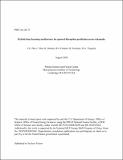Hybrid deep learning architecture for general disruption prediction across tokamaks
Author(s)
Zhu, Jinxiang; Rea, Cristina; Montes, Kevin J.; Granetz, R.S.; Sweeney, Ryan; Tinguely, R. Alex; ... Show more Show less
Download20ja072_full.pdf (881.2Kb)
Metadata
Show full item recordAbstract
In this paper, we present a new deep learning disruption prediction algorithm based on important findings from explorative data analysis which effectively allows knowledge transfer from existing devices to new ones, thereby predicting disruptions using very limited disruptive data from the new devices. The explorative data analysis conducted via unsupervised clustering techniques confirms that time-sequence data are much better separators of disruptive and non-disruptive behavior than the instantaneous plasma state data with further advantageous implications for a sequence-based predictor. Based on such important findings, we have designed a new algorithm for multi-machine disruption prediction that achieves high predictive accuracy on the C-Mod (AUC=0.801), DIII-D (AUC=0.947) and EAST (AUC=0.973). tokamaks with limited hyperparameter tuning. Through numerical experiments, we show that boosted accuracy (AUC=0.959) is achieved on EAST predictions by including in the training only 20 disruptive discharges, thousands of non-disruptive discharges from EAST, and combining this with more than a thousand discharges from DIII-D and C-Mod. The improvement of predictive ability obtained by combining disruptive data from other devices is found to be true for all permutations of the three devices. Furthermore, by comparing the predictive performance of each individual numerical experiment, we find that non-disruptive data are machine-specific while disruptive data from multiple devices contain device-independent knowledge that can be used to inform predictions for disruptions occurring on a new device.
Description
Submitted for publication in Nuclear Fusion
Date issued
2020-08Department
Massachusetts Institute of Technology. Plasma Science and Fusion CenterJournal
Nuclear Fusion
Publisher
IOP
Other identifiers
20ja072